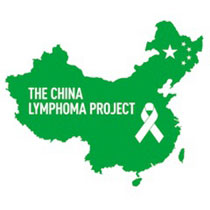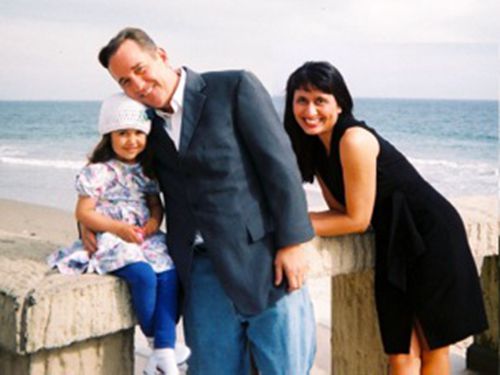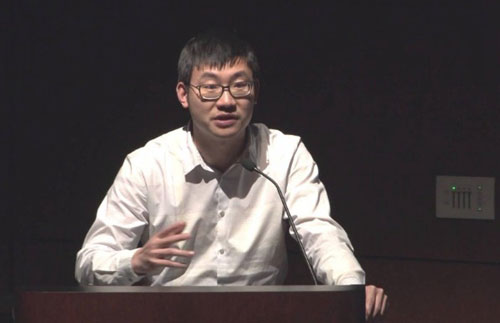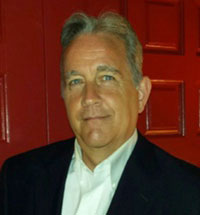 Jamie Reno, an award-winning journalist, author, songwriter and cancer survivor from San Diego, has initiated a cancer project in China to provide medical information and psychological and emotional support to patients with lymphoma, the world’s most common type of blood cancer.
Jamie Reno, an award-winning journalist, author, songwriter and cancer survivor from San Diego, has initiated a cancer project in China to provide medical information and psychological and emotional support to patients with lymphoma, the world’s most common type of blood cancer.
“Despite some political rhetoric nowadays, so many exciting things, especially in science and technology, are going on between China and the United States,” Reno told sino-us.com. He hopes partnership projects like the one his group is pushing could benefit people in need and help strengthen the friendship between the two countries.
The China Lymphoma Project, which is lauded by its initiators as a historic technology-based initiative the likes of which has never been attempted, had its global launch and conference this January at the Sanford Consortium for Regenerative Medicine in San Diego. China's US Consulate for Science was one of the keynote speakers, as were some of the most renowned Chinese and American lymphoma physicians and researchers.
Reno’s friendship project plans to provide China's lymphoma patients a specially designed mobile phone application and website to educate them about this very treatable cancer, update them with available treatments in China, entertain them as they go through their cancer battle, and inform them of ongoing clinical trials worldwide that may have breakthroughs. Another main effort is a book documenting exclusive stories of Chinese and American people who have beaten lymphoma.
When asked what prompted him into such an ambitious global cause, Reno shared some of his personal experiences with cancer and his longtime personal respect and affection for the people of China.
Need of information and inspiration
Reno was diagnosed with stage IV non-Hodgkin’s lymphoma 20 years ago this month and told by his doctor he only had three years’ life left. At the time, he was stunned and alone. “The first thing I wanted to do was to find a book of survival stories,” he recalled. But he soon realized the book he longed for did not exist.
His expectation of being informed and inspired in the toughest days finally led to a book of his own—Hope Begins in the Dark, which compiled inspiring personal accounts of 50 lymphoma survivors in the United States including Microsoft co-founder Paul Allen, former National Football League quarterback Joe Ferguson, and many others. Subsequent editions of the popular book have included the stories of such notable lymphoma survivors as Chicago Cubs World Series star Anthony Rizzo and Lymphoma Research Foundation Chairman Michael Werner.

Jamie Reno lives now with his wife and daughter in San Diego. Photos: provided by Reno
The book has been very well received globally. But Reno is determined to help his friends in China. He and his acclaimed team are now translating original stories of American lymphoma survivors into Chinese and adding new stories about China’s lymphoma survivors.
Reno has already met with and interviewed many China lymphoma survivors for the new book, which will be available in Chinese and English online and in print form. One of the many survivors he still hopes to talk to is Lee Kai-Fu, the Beijing-based venture capitalist best known for his role as founding president of Google China and his work with Microsoft and Apple.
Li announced that he had stage IV lymphoma in the fall of 2013, and declared to have recovered in June 2015. When asked what the biggest challenge is to interview Chinese survivors, Reno expressed that it usually takes time to establish trust. “But once you do, you have a friend for life,” he added.
Having defeated cancer three times, Reno knows that the social and psychological support mean a lot for cancer patients and their families. “They need information about the most effective drugs and treatments they could take, and they need positive survival stories to lift their spirits and bring strength. All these would increase probability of their survival,” Reno explained. Recent years have seen lymphoma rise to become the ninth most common cancer among Chinese males on the mainland. Despite that fact, many Chinese people still lack awareness and knowledge about cancer.
Reno first learned about the alarming rise in the number of lymphoma cases in China through a South China Morning Post article three years ago. Dr. Zhu Jun, director of the Beijing Cancer Hospital's lymphoma department told the newspaper that the incidence of lymphoma is increasing by more than six percent each year. “But that is not widely known,” said Jun, who noted that knowledge of the disease even among doctors in China is sketchy.
Reno then began to do his own research, by working with cancer hospitals in China and the United States. His co-director and medical director on the project is Dr. Kai Fu, an esteemed physician and lymphoma researcher at the Medical Center of Nebraska University who attended medical school at Tianjin Medical University in Tianjin, China.
Reno and his team confirmed the conclusion reached by the SCMP. “Even some oncologists in China are not familiar with lymphoma. When people receive a lymphoma diagnosis, many of them think their life is over,” said Reno, adding that if patients and their families regard the curable cancer as deadly, they too often just give up.
Based on his own experience, Reno doesn’t think a doctor should ever give a patient a timeline. “There are so many new treatments. It’s a very exciting time for cancer research in China, with all the new treatments, drugs and clinical trials, while the problem is that the information has not gotten to the people,” he said.
If you search keywords “China” and “lymphoma” on google.com, the first thing that pops up will be a Times of San Diego article written by Reno titled, “Dear China: Lymphoma is not a Death Sentence.” And this is the message Reno and his partners would like to deliver, and the motivation for them to embark on the China Lymphoma Project.
Culprits of cancer increase in China
It is widely reported these days that China has almost four times the number of cancer deaths as the United States. At the global launch conference of Reno’s project, experts agreed that multiple reasons have caused the rise in cancer cases in China. One is the increase in air pollution, which chiefly affects urban areas. The other is an increase in water pollution that has a big impact on rural areas.

Dr. Li Zhizhong, the author of a popular blog on cancer and a bestselling book on China cancer patients participates in the global launch conference.
“China is heavily polluted. If you are being exposed to particles that are horrible for your body then that will increase the risks of all kinds of diseases, including cancer,” said Li-Rong Lilly Cheng, the director of the Confucius Institute at San Diego State University. Cheng is a member of the China Lymphoma Project and has visited China several times in the past year as an ambassador for the organization.
"Science and technology are vitally important parts of our forward-thinking initiative," said Reno, who noted that the project's staff includes two esteemed epidemiologists: Brian Chiu from the University of Chicago, and Steven Coughlin from Augusta University.
When asked if lymphoma is closely related to air and water pollution, Reno explained that causes for lymphoma are not nailed down yet. “What we’re sure of is that cancer is very much related to chemical pollution. For example, a weed killer produced by Monsanto Company has proven to cause lymphoma,” he said, adding a notable fact that epidemiologists he's now working with have learned that Western diet in China may also contribute to cancer.
“Chinese lifestyle behaviors, including consumption and diet, have changed a lot with China’s prospering economy. People are not used to it, and it has a strange impact on their bodies. The chances of cancer have gone up.”
Zevalin reaching to China
“The project is perfectly timed. Several partnerships regarding lymphoma treatment research between the two countries are going on,” Reno said. On the most recent advancements, he said that one of the most effective FDA-approved treatments for non-Hodgkin's lymphoma has just been made available for the first time to cancer patients in China.
Zevalin, a remarkable but underutilized radio-immunotherapy that successfully treats some of the most common types of non-Hodgkin's lymphoma, including the kind that Reno himself has been battling for the last 20 years, is now available for patients at Hong Kong Sanatorium & Hospital, one of the leading private hospitals in Hong Kong.
Spectrum Pharmaceuticals, an American biotech company that owns and manufactures Zevalin, granted the exclusive rights to the drug in China to CASI Pharmaceuticals, an American company whose primary focus is China's unmet needs in cancer and other illnesses.
“We are very pleased that we can now provide Zevalin in Hong Kong hospitals and help address the unmet medical needs there," Dr. Rong Chen, CASI’s chief medical officer, said recently in a statement. He noted that eventually the treatment will be available in other areas of greater China.
 Jamie Reno
Jamie Reno
For 20 years, Reno worked his day job as a Newsweek magazine correspondent; he covered the 9/11 investigation, war in Iraq, five presidential elections, cancer breakthroughs, and the 2008 Beijing Olympics. He has won more than 150 SPJ (Society of Professional Journalists) and Press Club awards, including the prestigious Best of Show award four times.
But among all of the achievements in his career and life, Reno regards his efforts to help cancer patients and their families the most rewarding.
Over the years, Reno has been busy with various cancer projects. He has worked with nonprofits, cancer hospitals, and renowned oncologists to initiate 12 cancer advocacy projects. “Much of my life now is dedicated to helping cancer patients and their families,” said Reno, who introduced the new project to sino-us.com over the phone. Even though the long distance between San Diego and Beijing made his voice vague at times, his warmth, passion and candid elaboration were well delivered.
“We are now in the fundraising stage of the project. We need financial support, of course, to complete this work. We accept tax-deductible educational grants through our non-profit 501c3 partner, the Asian Heritage Society, which is a prestigious and global educational and health-focused organization based in Southern California,” he said.
The China Lymphoma Project’s Jamie Reno can be reached directly at [email protected] or [email protected]
 Jamie Reno, an award-winning journalist, author, songwriter and cancer survivor from San Diego, has initiated a cancer project in China to provide medical information and psychological and emotional support to patients with lymphoma, the world’s most common type of blood cancer.
Jamie Reno, an award-winning journalist, author, songwriter and cancer survivor from San Diego, has initiated a cancer project in China to provide medical information and psychological and emotional support to patients with lymphoma, the world’s most common type of blood cancer.

 Jamie Reno
Jamie Reno